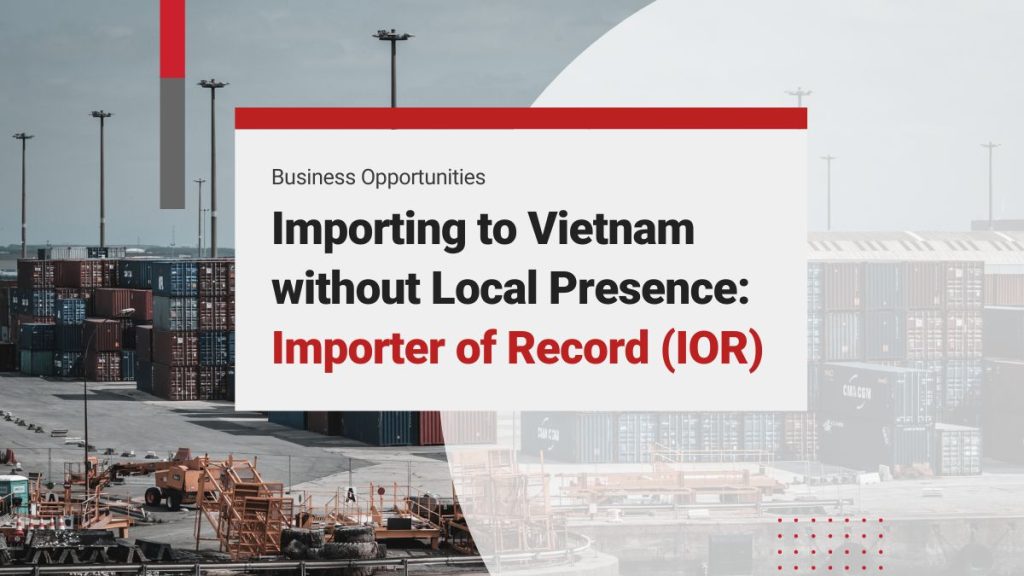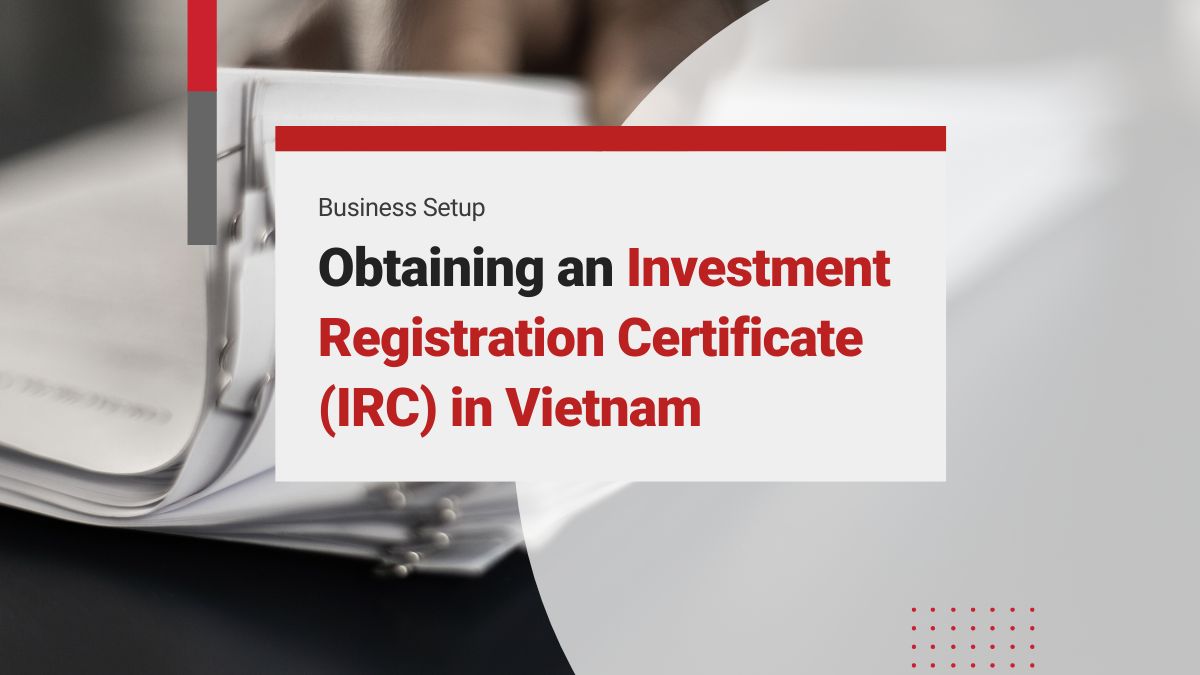In Vietnam’s tightly regulated import environment, foreign companies face lengthy processes to register entities, secure licenses, and clear shipments. An Importer of Record (IOR) can dramatically accelerate this process. By designating a local IOR – a Vietnamese-registered company or broker authorized via Power of Attorney – importers avoid months of setup and navigate customs compliance quickly and cost-effectively. In practice, the IOR is the official consignee on shipment documents, legally responsible for ensuring goods meet all Vietnamese import rules and for paying duties and taxes. This role is especially valuable for foreign businesses testing Vietnam’s market or importing small volumes, because it eliminates the need to establish a local company or obtain import licenses upfront.
An Importer of Record (IOR) in Vietnam is a local legal entity – often a licensed customs broker or logistics provider – that stands in as the official importer on all customs paperwork. The IOR is recorded on entry documents and assumes liability for compliance with Vietnam’s import laws. In effect, the IOR handles all import-related obligations on behalf of the overseas seller or buyer.
This includes preparing and submitting customs declarations, managing permits or licenses for regulated products, arranging payment of import duties and taxes, and coordinating with freight carriers and customs authorities until the goods reach their final destination. The IOR may also assist with product registration, labeling compliance, and record-keeping, helping ensure that all legal requirements are met before and after shipment.
Why Use an IOR When Importing to Vietnam?
Foreign companies often face delays and heavy paperwork when importing goods into Vietnam. Setting up a local trading entity can take three to six months, and customs clearance requires valid import licenses and tax registration, further slowing market entry. In contrast, an Importer of Record enables immediate importation. With existing licenses and customs credentials, an IOR can clear goods as soon as they arrive, avoiding long entity-formation procedures.
An IOR also reduces compliance risks. Professional providers understand Vietnam’s customs rules, ensure proper product classification, complete documentation accurately, and secure required permits. This helps prevent delays caused by misclassification or missing licenses. As one advisory notes, working with a qualified IOR “maintains positive relations with customs authorities” and minimizes potential penalties. For foreign SMEs and startups, IOR services offer a fast, cost-effective way to enter the market and test demand before committing to a full local presence.
Key Responsibilities of an Importer of Record
An IOR in Vietnam takes on all formal duties required to legally import goods. Key responsibilities include:
Compliance & Documentation: Preparing and submitting all customs paperwork accurately. This includes commercial invoices, packing lists, bills of lading or air waybills, and import declarations. The IOR ensures these documents correctly describe the goods, their values, and their origin. In particular, the IOR will secure any certificates of origin needed for preferential tariff treatment under free trade agreements.
Product Classification: Assigning the correct Harmonized System (HS) codes to each product. Proper HS classification is crucial because it determines the duty rate. The IOR reviews the product details and uses the HS schedule to classify goods accurately. Incorrect classification can trigger penalties or delays, so this task is handled with care.
Licenses & Permits: Obtaining import licenses or permits for regulated items. Certain products – such as medical devices, pharmaceuticals, food, chemicals, or high-tech equipment – require prior approval from Vietnamese authorities. The IOR identifies these requirements and applies to the relevant agencies. Without the correct license or certificate, customs will not clear the shipment.
Tax and Duty Payment: Paying import duties, Value-Added Tax (VAT), and other applicable taxes on behalf of the importer. The IOR calculates duties based on customs valuations and tariff rates, then makes the payment. In Vietnam, the standard VAT on imports is 10% (some goods have lower rates), and there may also be special consumption tax on luxury items and environmental fees on certain products. The IOR arranges all payments so that the shipment can be released.
Customs Clearance: Managing the import entry process at Vietnamese ports or airports. The IOR files the electronic customs declaration (via Vietnam’s VNACCS/VCIS system), coordinates any inspections, and follows up until customs clears the goods. If any issues arise during clearance (for example, questions about documents or random inspections), the IOR handles communications with customs on behalf of the importer.
Final Delivery: Arranging delivery of the goods from the port of entry to the importer’s location. After customs release, the IOR can use its logistics network to transport the shipment to the importer’s warehouse or end-customer. This “door-to-door” approach means the importer does not have to manage the physical freight or storage.
Record-Keeping and Reporting: Maintaining detailed import records – invoices, receipts, and compliance documents – for auditing and future reference. This helps the importer fulfill any ongoing regulatory obligations and defend against post-clearance audits. Good record-keeping is especially important if the company later decides to set up its own operation in Vietnam; it will need these documents to prove past compliance.
Compliance Requirements and Contracts
Vietnamese law imposes strict rules on import transactions, so engaging an IOR requires formal documentation. In particular, Vietnam’s Commercial Law and Customs regulations mandate a written “Entrusted Import Service Contract” between the foreign importer and the IOR. This contract establishes that the IOR is authorized to import on the buyer’s behalf. Customs authorities require this agreement to verify the import’s purpose and to establish legal ownership of the goods. Without it, customs may refuse clearance or initiate post-shipment investigations.
Failure to properly document the IOR relationship is a serious risk. Tron Chan, a Vietnamese trade consultant, warns that if an importer simply declares shipments under the IOR’s name without a binding contract, customs may view this as smuggling or tax evasion. Such irregularities can lead to fines, shipment seizures, or even criminal liability. For example, if authorities find there is no contract or the Vietnamese consignee is not correctly documented, they may accuse the parties of illegally bypassing import duties.
Beyond the contract, the IOR must itself be a legally registered Vietnamese company with the proper credentials (valid business registration and customs e-declaration account). In practice, reputable IOR service providers handle all of this paperwork up front. They prepare the Entrusted Import Service Contract and a Power of Attorney (if required), ensuring that Vietnamese Customs can see the IOR is fully authorized. By contrast, attempting to import without these formalities risks long delays and legal troubles. In short, any foreign importer using an IOR should insist on a formal contract and keep copies ready for customs inspections.
Leveraging Vietnam’s Free Trade Agreements
Vietnam has rapidly expanded its trade liberalization efforts, joining ASEAN and the WTO and signing more than 50 agreements, including 17 active FTAs by 2025. Key deals include ASEAN agreements (AFTA, ACFTA, AKFTA, AJCEP, AANZFTA), CPTPP, RCEP, EVFTA, UKVFTA, VKFTA, the Vietnam–Japan EPA, and newer agreements like VIFTA and the Vietnam–UAE FTA. These FTAs significantly cut or eliminate tariffs on thousands of imported products.
A skilled Importer of Record helps businesses unlock these benefits. Machinery or spare parts from ASEAN countries can qualify for 0% tariffs under ATIGA or other ASEAN FTAs. Many goods from Japan, Korea, and the EU can also enter duty-free, provided the Certificate of Origin is valid. An IOR ensures origin criteria are met and files the correct documents to secure the lower rate.
Imports from non-FTA countries, such as the U.S., face Vietnam’s full MFN tariff. While an IOR cannot change the tariff itself, they can advise on origin rules, supply chain structuring, and options like bonded warehouses to legally reduce duty costs. They also manage all trade documentation so importers don’t miss eligible savings.
Key takeaway: Use an IOR to ensure your goods qualify for any preferential tariffs under Vietnam’s FTAs. Work with them to secure all required proof of origin and take full advantage of 0–5% tariff rates, rather than paying much higher standard duties. This is part of what makes the IOR service “a fast, compliant, and hassle-free way to bring goods into the country”.
When Should You Use an Importer of Record?
Foreign companies should consider IOR services in several scenarios:
Testing the Market: If you want to introduce products in Vietnam quickly without committing to a local office, use an IOR. This way you can gauge demand before incurring setup costs. If you “don’t want to set up a legal entity” or are “importing a few shipments” to test viability, an IOR is the ideal alternative.
Small or Infrequent Imports: Businesses that import infrequently or in small volumes often don’t need a full trading company. For such companies, IOR services eliminate the overhead of compliance staff, warehousing, and licensing.
High-Compliance Goods: Products subject to strict regulation (such as pharmaceuticals, cosmetics, chemicals, or civil cryptography equipment) can be very difficult to import without expertise. The IOR’s compliance team can navigate licenses, technical standards, and inspections.
Avoiding Corporate Overhead: Some companies simply want to maintain control over their supply chain without altering their corporate structure. An IOR lets them keep purchasing and ownership offshore, while ensuring logistics run smoothly in Vietnam. They avoid committing capital to a subsidiary and can still reap the benefits of local support.
Domestic Importers with Challenges: Even Vietnam-based buyers sometimes use IORs. Local SMEs that lack customs expertise or those importing goods with demanding standards (e.g. advanced electronics) may find an IOR more efficient. The IOR reduces staffing needs and can often get faster clearance than a small company struggling with regulations.
In summary, any time the importer does not have a full-fledged Vietnamese entity (or does not want to use it), the IOR solution makes sense. It is especially critical for foreign sellers (exporters) who have no physical presence in Vietnam.
How the Importer of Record Service Works
Engaging an IOR service typically involves these steps:
- Sign a Service Agreement: The foreign company signs an IOR service contract and usually a Power of Attorney with the Vietnamese provider. This formalizes the arrangement. The agreement specifies the scope of services (documents to be handled, fees, liabilities, etc.). It protects both parties and satisfies the legal requirement for an entrusted import contract.
- Notify Your Supplier: The supplier is instructed to ship the goods with the IOR listed as consignee or notified party on all shipping documents. That way, customs will recognize the local IOR as responsible. The IOR also collects copies of the seller’s commercial invoices, packing lists, certificates of origin, and any other required papers.
- Pre-Shipment Check: The IOR reviews the documentation and product details in advance. They verify HS codes, check if licenses or permits are needed, and confirm duty rates and taxes. If any additional approvals are required (for example, food or drug registration), the IOR handles those before import.
- Import Declaration: When the goods arrive in Vietnam, the IOR files the electronic customs declaration (via VNACCS/VCIS) using the provided documents. The IOR may coordinate inspection by customs or other agencies if needed. Throughout this process, the IOR communicates with port authorities until clearance is granted.
- Payment and Release: The IOR pays the assessed import duties, VAT, and any other fees on behalf of the importer. Once payment is confirmed, customs releases the goods. The IOR then arranges transport to the importer’s premises or preferred delivery point.
- Post-Import Support: After delivery, the IOR provides copies of finalized customs documents and receipts. They keep records as required by Vietnamese law (which the importer can use later). The IOR can also assist with any after-sales compliance, such as re-export arrangements or audits.
Benefits of Using an IOR in Vietnam
- Speed to Market: The IOR enables immediate importation without waiting for local licensing or corporate setup. This accelerates market entry by months.
- Regulatory Expertise: You gain instant access to Vietnamese customs know-how. The IOR stays updated on law changes and handles all compliance matters, reducing the risk of fines or rejections.
- Cost Savings: Rather than investing in a local subsidiary, fixed staff, and warehousing, you pay only for the IOR’s service fees per shipment. This is especially economical during initial market testing or for occasional imports.
- Flexibility: IOR services scale with your needs. You can import a single small shipment or regular large volumes. The IOR adapts its resources accordingly.
- Focus on Core Business: Companies can focus on production and sales while the IOR handles logistics and customs. You keep control of supply decisions without diverting internal resources to regulatory tasks.
- FTA Utilization: An IOR helps ensure you get the lowest tariffs by managing origin documentation and advising on trade agreements. This can improve your competitiveness in price-sensitive markets.
- Reduced Risk: With a local partner handling compliance, the chances of costly mistakes are much lower. Your liability is confined to the contract with the IOR, who shoulders responsibility for following Vietnamese law.
Overall, an IOR service provides peace of mind. As one advisor summarizes, a good IOR “ensures smooth shipment clearance and minimizes the risk of fines, penalties, or delays”. Foreign exporters can enter Vietnam confidently, knowing an experienced team manages the bureaucratic details on their behalf.
Conclusion
In Vietnam’s complex import regime, the Importer of Record (IOR) has become a critical partner for foreign businesses. An IOR service offers a fast, compliant path to market by acting as the local importer on your shipments. It handles customs documentation, classification, duties, and delivery – essentially serving as your in-country import office. This saves precious time and prevents costly errors, especially for companies without an existing Vietnam entity.
Crucially, an IOR also helps you leverage Vietnam’s vast network of free trade agreements. By properly documenting origin and qualifications, it can secure tariff reductions under CPTPP, EVFTA, RCEP and others. Such savings can make your products more competitive in Vietnam’s growing market.
For foreign companies eyeing Vietnam, selecting a reputable IOR should be a top priority. Look for providers with strong customs expertise, transparent processes, and a proven track record. Ensure they prepare a proper Entrusted Import Service Contract to comply with Vietnamese law. With the right IOR partner, your imports will clear smoothly, letting you focus on expanding your business in Vietnam without delay.
Check out InCorp Vietnam’s Legal Advisory for your Importer of Record (IOR) right now!

clients worldwide

professional staff

incorporated entities in 10 years

compliance transactions yearly
Learn the Right Setup for Business
Expansion in the Vietnam
Frequently Asked Questions
Can The Exporter Be The Importer Of Record
- Yes, the exporter can also be the importer of record if they meet the legal and regulatory requirements of the importing country. This includes assuming responsibility for customs clearance, duties, and compliance.
Does The Importer Of Record Own The Goods
- Not necessarily. The importer of record is responsible for ensuring that goods are properly declared and duties are paid, but they may be acting on behalf of the actual owner or buyer. Ownership depends on the terms of the sale and shipping agreement.
How To Become An Importer Of Record
- To become an Importer of Record (IOR), you need to obtain an import license or permit if required, register with customs authorities in the destination country, and secure a tax ID or business number. You must also ensure compliance with all import regulations, including product classification, valuation, and documentation.
Is Importer Of Record The Same As Consignee
- No, the importer of record is responsible for ensuring that goods are legally imported and for paying duties and taxes, while the consignee is the party to whom the goods are shipped. They can be the same entity, but not always.






